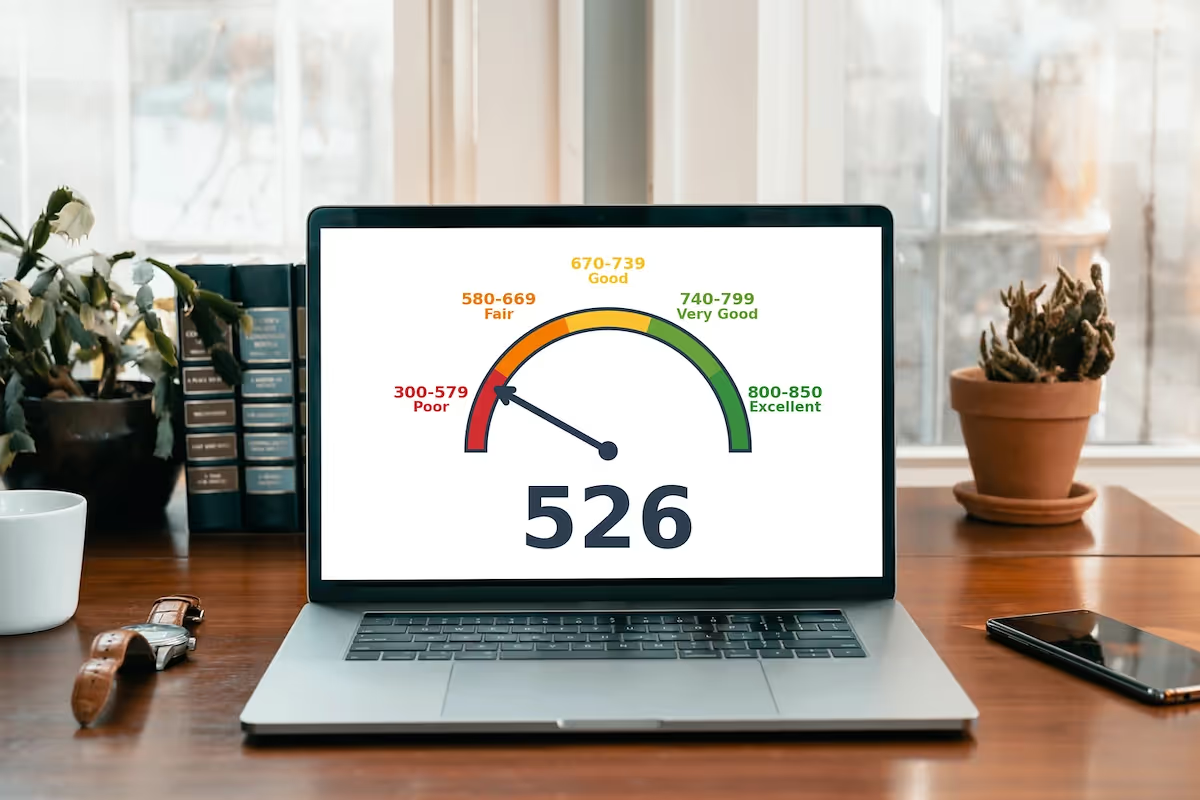
Kudos has partnered with CardRatings and Red Ventures for our coverage of credit card products. Kudos, CardRatings, and Red Ventures may receive a commission from card issuers. Kudos may receive commission from card issuers. Some of the card offers that appear on Kudos are from advertisers and may impact how and where card products appear on the site. Kudos tries to include as many card companies and offers as we are aware of, including offers from issuers that don't pay us, but we may not cover all card companies or all available card offers. You don't have to use our links, but we're grateful when you do!
526 Credit score: What You Need to Know in 2025
July 1, 2025


TL;DR
A 526 credit score offers a clear starting point for improving your financial standing. According to the FICO model, this score falls within the 'Poor' credit range, signaling a prime opportunity for growth.
What Does a 526 Credit Score Mean?
A credit score of 526 falls squarely into the "poor" range on the FICO scoring model, which spans from 300 to 850. Lenders generally view a score at this level as a sign of significant credit risk, often stemming from a history of missed payments, high debt levels, or other negative financial events. This perception can create substantial barriers when you're trying to access new credit or loans, as financial institutions may see you as a high-risk borrower.
Practically, this means you'll likely face difficulty getting approved for mortgages, auto loans, and unsecured credit cards. If you do receive an offer, it will probably come with unfavorable terms, such as steep interest rates and fees, making borrowing much more expensive. While a 526 score presents immediate financial challenges, it's not a permanent sentence. It represents a starting point from which you can begin to build a healthier credit history and improve your financial standing over time.
Who Has a 526 Credit Score?
While age isn't a direct factor in credit score calculations, there is a clear correlation between age and average credit scores. According to 2023 Experian data, older generations tend to have higher scores, largely due to factors like a longer credit history. Here is the breakdown of average FICO scores by generation:
- Generation Z (ages 18-26): 680
- Millennials (ages 27-42): 690
- Generation X (ages 43-58): 709
- Baby Boomers (ages 59-77): 745
- The Silent Generation (ages 78+): 760
Credit Cards With a 526 Credit Score
A 526 credit score falls into the 'poor' range, which can make qualifying for traditional credit cards a significant challenge. Most mainstream lenders view this score as high-risk, often leading to immediate denials for their most popular unsecured card offerings. While your options are more limited, there are still pathways to obtaining a credit card, primarily through products specifically designed for building or rebuilding credit.
Kudos can help you find the right card for your financial situation with its suite of personalized recommendation tools. By either analyzing your real-time spending habits or using a quiz to understand your preferences, Kudos sifts through nearly 3,000 cards to find the best match for your goals.
Auto Loans and a 526 Credit Score
A 526 credit score places you in the subprime borrower category, which can make securing an auto loan more challenging. Lenders will likely offer you significantly higher interest rates and may require a larger down payment than applicants with stronger credit histories.
According to an automotive finance report, here is how average interest rates break down across different credit score brackets:
- Super-prime (781-850): 5.25% for new cars and 7.13% for used cars
- Prime (661-780): 6.87% for new cars and 9.36% for used cars
- Non-prime (601-660): 9.83% for new cars and 13.92% for used cars
- Subprime (501-600): 13.18% for new cars and 18.86% for used cars
- Deep subprime (300-500): 15.77% for new cars and 21.55% for used cars
Mortgages at a 526 Credit Score
A 526 credit score makes buying a home challenging, but not impossible. Your primary option will likely be an FHA loan, which has minimum credit score requirements as low as 500 if you can provide a 10% down payment. Conventional loans are generally unavailable, though some specialty lenders may offer non-prime mortgages for sub-580 borrowers.
This score will significantly impact your loan terms. You can expect higher interest rates and fees, increasing your total borrowing cost over time. Lenders will also require a larger down payment to offset risk and will likely put your application through manual underwriting, where your income, debt, and savings are scrutinized more closely.
What's in a Credit Score?
Figuring out what goes into your credit score can feel like trying to solve a complex puzzle, but it generally boils down to a handful of key elements. The most common factors include:
- Your history of making payments on time is the most significant factor.
- How much of your available credit you're currently using, known as your credit utilization ratio, plays a major role.
- The age of your credit accounts, including the average age and the age of your oldest account, is also considered.
- Lenders like to see that you can responsibly manage different types of credit, such as credit cards and loans.
- Opening several new credit accounts in a short period can be seen as a risk and may temporarily lower your score.
How to Improve Your 526 Credit Score
Your credit score plays a crucial role in your financial life, but no matter your starting point, it is always possible to improve it. While it takes time and consistent effort, taking the right steps can lead to meaningful changes and help you build a healthier credit profile.
- Establish Automatic Bill Payments. This ensures you never miss a due date, which is the single most important factor in your credit score calculation. Building a consistent, on-time payment history is the foundation for recovering from a 526 score.
- Reduce Your Credit Utilization. Lenders look at how much of your available credit you're using, and a high ratio can signal risk. Paying down balances to get below the recommended 30% mark can provide a significant and relatively quick boost to your score.
- Apply for a Secured Credit Card. A 526 score can make it difficult to get approved for traditional credit, but a secured card requires a cash deposit, making it an accessible option. This allows you to build a positive payment history with a new account, which is essential for improving your score.
- Monitor Your Credit Reports. Errors on your credit report are surprisingly common and can unfairly drag down your score. Regularly reviewing your reports allows you to spot and dispute these inaccuracies, which can be one of the fastest ways to see an improvement.
As you build these positive habits, using a tool like Kudos can help you make smarter spending decisions and get the most value from your credit.
Unlock your extra benefits when you become a Kudos member

Turn your online shopping into even more rewards

Join over 400,000 members simplifying their finances

Editorial Disclosure: Opinions expressed here are those of Kudos alone, not those of any bank, credit card issuer, hotel, airline, or other entity. This content has not been reviewed, approved or otherwise endorsed by any of the entities included within the post.



































.webp)



.webp)



.webp)

